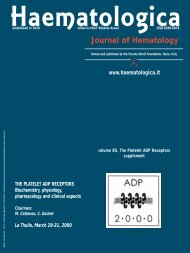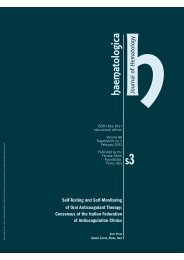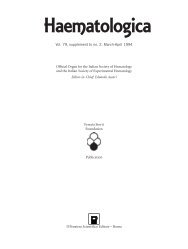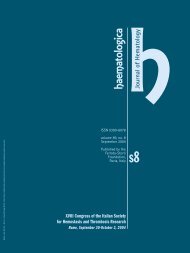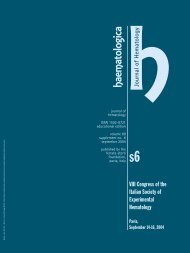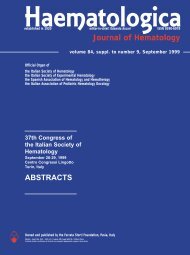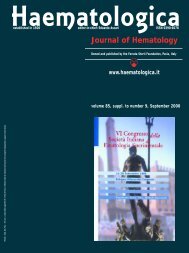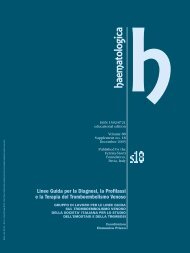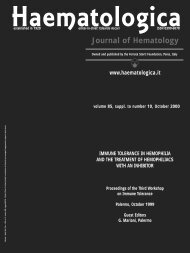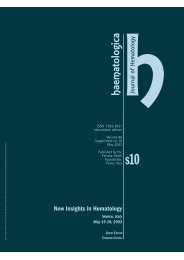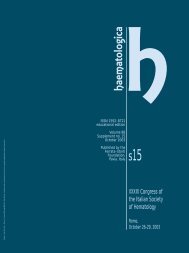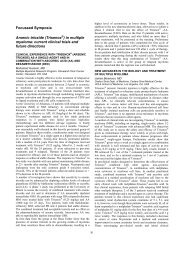90A. Huth-Kühne et al.Table 3. Details of treatment andoutcome. IA = immunoadsorption.adsorption technique, introduced by Knöbl et al.in 1995, 42 has been successfully applied to theelimination of apolipoprotein, 43-45 HLA antibodiesin renal transplant recipients 46 and auto- andalloantibodies to FVIII:C. 25-28We included 8 patients to the MHMP. Inhibitorelimination was achieved in all patients and, aftera period of 43 months in median, 7 patients continueto be in remission. One patient died due tohis underlying medical condition, 8 months afterthe end of treatment. Therapy was well toleratedwithout any serious side effects. For the managementof acute bleeding, patients received rFVIIaas first-line therapy applied by continuous infusion.This mode of application reduced rFVIIarequirements and bleeding was successfully controlledin all patients. In contrast to the treatmentfollowing the MBMP (bolus injections of rFVIII100–200 IU/kg q.i.d.), we applied a modified factorVIII regimen with a single bolus of 200 IU/kgfollowed by 200 IU/kg per 24 hours as continuousinfusion. This mode of application was as effectiveas the original, despite a 50% reduction in dose,and yielded additional cost benefits.Immunosuppressive therapy and immune-modulation,including IVIG, high-dose FVIII andextracorporeal IA comprise the MHMP protocol.Because each of these immune-modulatory strategies,described below, target a different aspect ofthe immune system and work, in part, synergistically,we believe this treatment protocol to be verypromising.Immunosuppressive and cytotoxic agentsCorticosteroids suppress immune responsesmediated by B- and T-lymphocytes. By inhibitinginterleukin-2 they prevent B-cells from respondingto T-helper lymphocytes, thus reducing immunoglobulinproduction. 47Cytotoxic agents kill actively proliferating cells,acting preferentially on cancer cells and cells ofthe immune system. The survey by Green andLechner, 1 which included 215 patients withacquired inhibitors to FVIII:C, reported efficacyrates of 30% for corticosteroid medication alone,57% for corticosteroids and cyclophosphamide,and 68% for corticosteroids and azathioprine,respectively.ImmunoglobulinsIVIG exerts its effect by complex formation withthe circulating antibodies.This is mediated viaanti-idiotype antibodies present in the normalantibody population and in the pooled plasmathat comprise IVIG. 48-51 These anti-idiotypic antibodiesalso bind and downregulate the B-cellreceptor for antigen thus decreasing autoantibodyproduction. There are several reports and oneprospective clinical trial, which demonstrate variabledegrees of responsiveness to IVIG treatmentin patients with acquired hemophilia. 52,53 The factthat the binding of Fab2 fragments from theimmunoglobulin preparation to the autoantibodywas responsible for the suppression of the autoantibodyprovided the first convincing evidence forthe manipulation of the immune system by antiidiotypicantibodies. 21 Another mechanism ofaction might be an acceleration in the rate of IgGcatabolism. Such a change may be induced by highdoses of exogenous IgG and results in the eliminationof individual IgG molecules in direct proportionto their relative concentration in plasma.54,55Re-induction of immune tolerance with highdoseFVIIIMechanisms by which high doses of FVIIIreduce the anti-FVIII:C antibodies are not clearlyunderstood. They can induce anti-idiotypic antibodies,which bind to the variable region of thehaematologica vol. 88(supplement n. 12):september <strong>2003</strong>
IV International Workshop on Immune Tolerance in Hemophilia 91anti-FVIII:C antibodies and neutralize them. 56Alternatively, high-dose FVIII may stimulate thepathologic cell clone responsible for antibody synthesisvia antigen presentation and render it moresusceptible to immunosuppressive and cytotoxicagents. 19Extracorporeal IA (Ig-Therasorb ® )This new adsorption technique was introducedfor the treatment of acquired hemophilia by Knöblet al. 42 It leads to an extensive reduction of immunoglobulinsfrom intravascular space and changesthe distribution of antibodies and immune complexesbetween intra- and extravascular compartmentsleading to mobilization of antibodies frominterstitial sites, especially when applied as longtermtreatment.ConclusionsAcquired hemophilia caused by inhibitory autoantibodiesto FVIII or FIX is still associated withhigh morbidity and mortality. Since rFVIIa is available,therapy of acute and life-threatening hemorrhagehas been considerably enhanced. Thechoice of treatment for acute bleeds should bebased on the clinical presentation rather than onthe level of the inhibitor titer. rFVIIa should beconsidered as first-line therapy because of its highefficacy and better side-effect profile as comparedto PCCs, APCCs.High dose continuous FVIII infusion as appliedin the MHMP appears to be an effective alternativeto bolus infusion as a means of presentingsufficient antigen and to reduce FVIII requirement.Considering the side-effects of immunosuppresivetherapy, which should be part of any regimen forinhibitor elimination, a major advantage of ourprotocol is the relatively short time-course of immunosuppressivetherapy. We achieved inhibitorelimination in less than 3 weeks (median) and allpatients continue to be in remission. The combinationof immunosuppression and immunomodulatorystrategies proved very successful and representsan alternative therapeutic option inacquired hemophilia. Further evaluation in a largernumber of patients is required.References1. Green D, Lechner K. A survey of 215 non-hemophilicpatients with inhibitors to Factor VIII. Thromb Haemost1981;45:200-3.2. Shapiro SS, Hultin M. Acquired inhibitors to the bloodcoagulation factors. Semin Thromb Hemost 1975;1:336-85.3. Palascak JE. Autoantibodies Against Clotting Factors. In:Acquired Bleeding Disorders in Children: abnormalitiesof Hemostasis. Lusher JM, Barnhart MI, eds. New York:Masson; 1981. p. 99-113.4. Lusher JM, Hillman CRL. The Effect of Inhibitors on FactorAssays. In: Advances in Coagulation Testing: interpretationand application. Triplett DA, editor. Skokie, Illinois;College of American Pathologists. 1986. p. 73.5. Green D. The management of factor VIII inhibitors innon-hemophilic patients. Prog Clin Biol Res 1984; 150:337-52.6. Kessler CM, Ludlam CA. The treatment of acquired factorVIII inhibitors: worldwide experience with porcinefactor VIII concentrate. International Acquired HemophiliaStudy Group. Semin Hematol 1993;30(Suppl1):22-7.7. Kasper CK. Complications of hemophilia A treatment:factor VIII inhibitors. Ann N Y Acad Sci 1991;614:97-105.8. Gawryl MS, Hoyer LW. Inactivation of factor VIII coagulantactivity by two different types of human antibodies.Blood 1982;60:1103-9.9. Morrison AE, Ludlam CA. Acquired haemophilia and itsmanagement. Br J Haematol 1995;89:231-6.10. Hay CR. Innovative use of porcine factor VIII:C forimmune tolerance induction. Am J Med 1991;91 Suppl5A:27S-9S.11. Hedner U, Glazer S, Falch J. Recombinant activated factorVII in the treatment of bleeding episodes in patientswith inherited and acquired bleeding disorders. TransfusMed Rev 1993;7:78-83.12. Hay CR, Negrier C, Ludlam CA. The treatment of bleedingin acquired haemophilia with recombinant factorVIIa: a multicentre study. Thromb Haemost 1997;78:1463-7.13. Nilsson IM, Jonsson S, Sundqvist SB, Ahlberg A, BergentzSE. A procedure for removing high titer antibodies byextracorporeal protein-A-sepharose adsorption in hemophilia:substitution therapy and surgery in a patient withhemophilia B and antibodies. Blood 1981;58:38-44.14. Nilsson IM, Sundquist SB, Ljung R, Holmberg L, FreiburghausC, Björling G. Suppression of secondary antibodyresponse by intravenous immunoglobulin in apatient with haemophilia B and antibodies. Scand JHaematol 1983;30:458-64.15. Nilsson IM, Berntorp E, Zettervall O. Induction ofimmune tolerance in patients with hemophilia and antibodyto factor VIII by combined treatment with intravenousIgG, cyclophosphamide, and factor VIII. N Engl JMed 1988;318:947-50.16. Freiburghaus C, Berntorp E, Ekman M, Gunnarsson M,Kjellberg B-M, Nilsson IM. Tolerance induction using theMalmö treatment model 1982-1995. Haemophilia 1999;5:32-9.17. Negrier C, Dechavanne M, Alfonsi F, Tremisi PJ. Successfultreatment of acquired factor VIII antibody byextracorporeal immunoabsorption. Acta Haematol 1991;85:107-10.18. Watt RM, Bunitsky K, Faulkner EB, Hatt CM, Horan J,Ramstack JM, Viola JL, Yordy JR, and the HaemophiliaStudy Group. Treatment of congenital and acquiredhemophilia patients by extracorporeal removal of antibodiesto coagulation factors: a review of US clinical studies1987-1990. Transfus Sci 1992;13:233-53.19. Green D. Suppression of an antibody to factor VIII bycombination of factor VIII and cyclophosphamides.Blood 1971;37:381-7.20. Lian EC, Lacarda AF, Chiu AY. Combination immunosuppressivetherapy after factor VIII infusion for acquiredfactor VIII inhibitor. Ann Intern Med 1989;110:774-8.21. Sultan Y, Kazatchkine MD, Maisonneuve P, Nydegger VE.Antiidiotypic suppression of autoantibodies to factor VIII(antihaemophilic factor) by high-dose intravenous gammaglobulin.Lancet 1984;2:765-8.22. Schwartz RS, Gabriel D, Aledort LM, Green D, KesslerCM. A prospective study of treatment of acquired(autoimmune) factor VIII inhibitors with high-doseintravenous gammaglobulin. Blood 1995;86:797-80423. Brackmann HH, Gormsen J. Massive factor VIII infusionin haemophiliac with factor VIII inhibitor, high responder.Lancet 1977;2:993.24. Brackmann HH. Induced immunotolerance in factor VIIIinhibitor patients. Prog Clin Biol Res 1986;150:181-95.25. Zeitler H, Unkrig C, Brackmann H, Effenberger C, HanflandD, Stier S, Ko Y, Vetter H. An immunomodulatorytreatment of acquired hemophilia A with long-term IgGIA, immunosuppression, and antigen substitution – amodified Bonn protocol inducing immunotolerance.Blood 1997; 90 Suppl 1:36a[abstract].26. Hess L, Zeitler H, Unkrieg C, Nettekoven W, EffenbergerW, Hanfland P, et al. Successful inhibitor eradication inhaematologica vol. 88(supplement n. 12):september <strong>2003</strong>



